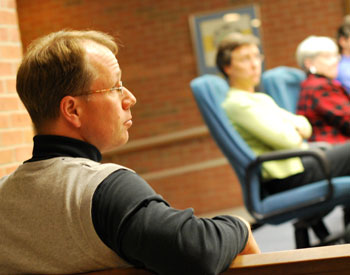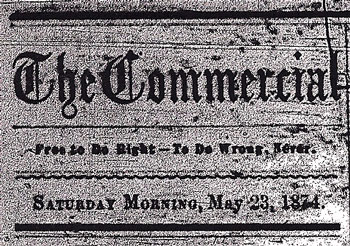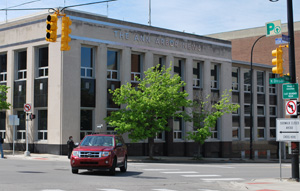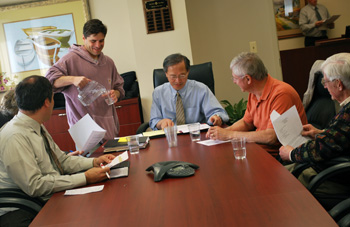Ann Arbor City Council meeting (April 19, 2010) Part 2: In Part 1 of this meeting report, we focused on the city’s budget process, parking issues and the University of Michigan commencement exercises.
In Part 2, we wrap up other topics of the meeting. One common theme was capital investments in the community’s physical infrastructure of various kinds.

Michael Nearing, city of Ann Arbor engineer, was available for any city council questions on the East Stadium bridge project. (Photo by the writer.)
The council allocated a total of $313,000 for three different permanent affordable housing projects in Ann Arbor.
The city’s East Stadium bridge replacement project received discussion in the form of a resolution that authorized the city to go after state funding for the third time in the last three years. The anticipated construction start for fall of this year has been postponed until spring 2011 – the earlier date had been tied to the city’s application for federal funding, which was rejected this February.
The ongoing construction of the police/courts building, directly adjacent to city hall (the Larcom Building), received some tangential discussion in the form of an explanation from Roger Fraser about the recent closure of city hall due to elevated carbon monoxide levels. The police/courts building was also the subject of public commentary that prompted some extended remarks from the mayor – which were covered in Part 1 of this report.
Another construction project that will likely factor into the upcoming primary election campaigns is Fuller Road Station. The city-university collaboration to build a combined parking deck and bus station, which might eventually serve as a commuter rail station, was taken up during the council’s communications time. Christopher Taylor (Ward 3) and mayor John Hieftje both responded to some cautionary remarks made by Mike Anglin (Ward 5), which he made based on a recent park advisory commission meeting.
In business related to ethics and rules, the council voted on two occasions to excuse the participation of Taylor in a vote, because of a conflict of interest posed by his employment with the law firm Butzel Long. They also satisfied the requirement of a recent lawsuit settlement that they formally consider a rule about their use of government email accounts – by voting to remand consideration of the issue to council’s rules committee. [Full Story]







